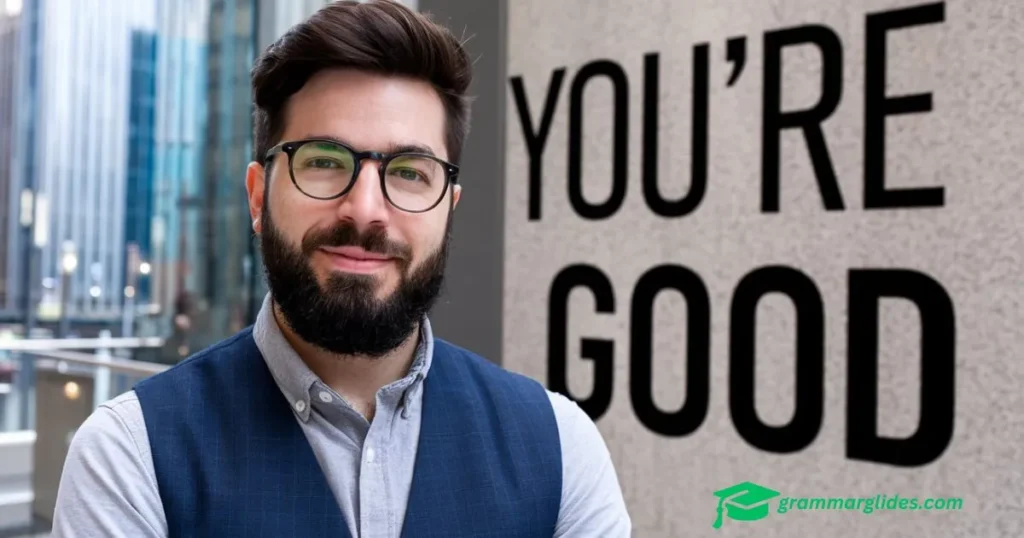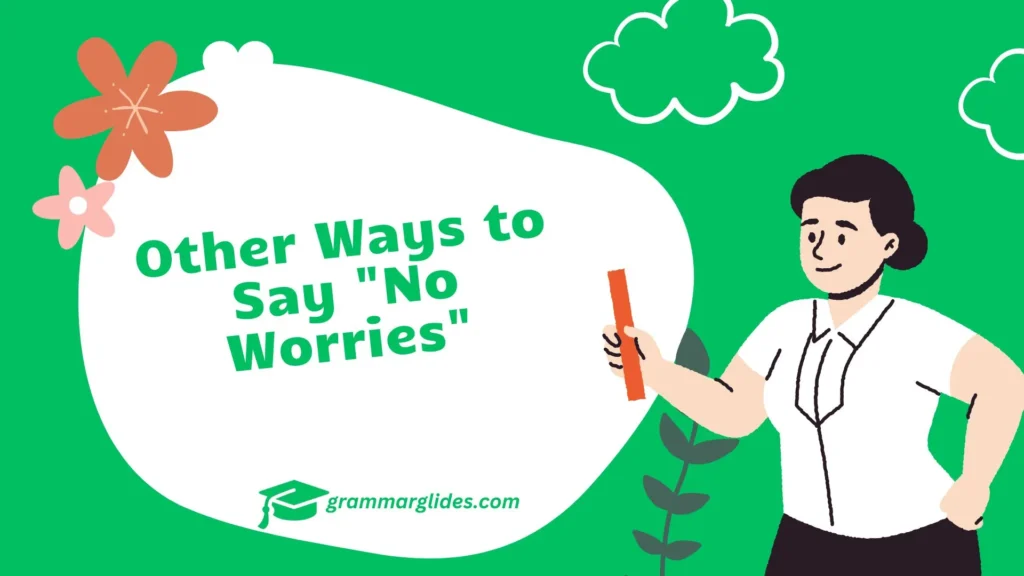When someone says “No worries,” it means everything is fine and there’s no need to stress. But sometimes, it’s nice to say it in a different way. There are many phrases you can use instead of “No worries.” In this blog post, we will explore 30 alternative phrases that you can use in different situations, along with scenarios and explanations for each phrase.
1. No Problem
Scenario: Your friend thanks you for helping them move to a new apartment.
Example 1: You say, “No problem at all! I’m happy to help.”
Example 2: You add, “You’re welcome! No problem; it was fun!”
Explanation: This phrase is friendly and reassuring. It shows that you enjoyed helping and that it was not an inconvenience.
2. It’s All Good
Scenario: A colleague apologizes for being late to a meeting.
Example 1: You respond with, “It’s all good; we haven’t started yet.”
Example 2: You say, “No worries, it’s all good. We can catch up now.”
Explanation: This phrase helps the other person feel relaxed, indicating that their lateness isn’t a big issue.
3. No Big Deal
Scenario: Someone accidentally spills coffee on your shirt.
Example 1: You say, “Hey, no big deal! It happens.”
Example 2: You add, “No big deal; I can clean it later.”
Explanation: This phrase communicates that the incident is minor and doesn’t require any stress.
4. Don’t Mention It
Scenario: A friend thanks you for helping them with their homework.
Example 1: You reply, “Don’t mention it; I enjoyed helping you!”
Example 2: You also say, “Really, don’t mention it! I’m glad to be of assistance.”
Explanation: This phrase shows that you are happy to help and that no thanks are necessary.
5. It’s Nothing
Scenario: Someone thanks you for lending them a book.
Example 1: You respond, “It’s nothing! Enjoy the read.”
Example 2: You say, “Really, it’s nothing. I just wanted to share it with you.”
Explanation: This phrase suggests that your act of kindness was not a burden to you.
6. No Need to Worry
Scenario: A coworker is stressed about an upcoming presentation.
Example 1: You say, “You’ve prepared well; no need to worry!”
Example 2: You reassure them by saying, “Trust your skills; there’s no need to worry about it.”
Explanation: This phrase helps ease someone’s anxiety by emphasizing their readiness.
7. All Good
Scenario: A family member forgets to pick up groceries.
Example 1: You say, “All good, I can go instead.”
Example 2: You add, “No problem, all good; we’ll manage.”
Explanation: This phrase indicates that everything is still fine and there’s no issue to stress over.
8. Not a Problem

Scenario: A friend wants to reschedule plans.
Example 1: You say, “Not a problem! Let’s find another time.”
Example 2: You add, “Not a problem; I’m flexible!”
Explanation: This indicates your willingness to adapt to their needs without any hassle.
9. You’re Welcome
Scenario: Someone thanks you for giving them directions.
Example 1: You respond, “You’re welcome! Glad to help.”
Example 2: You add, “You’re welcome! Anytime you need directions, ask me.”
Explanation: This classic response acknowledges their gratitude while being friendly.
10. Happy to Help
Scenario: A neighbor thanks you for watering their plants while they were away.
Example 1: You say, “Happy to help! Your plants look great.”
Example 2: You add, “I’m happy to help anytime!”
Explanation: This phrase expresses enthusiasm for assisting others and strengthens community ties.
11. Sure Thing
Scenario: A friend asks if you can cover their shift at work.
Example 1: You say, “Sure thing! I’ve got you covered.”
Example 2: You add, “Sure thing! Just let me know the details.”
Explanation: This conveys a casual acceptance, making it clear you’re agreeable to their request.
12. Not at All
Scenario: Someone apologizes for bothering you with a question.
Example 1: You respond, “Not at all! I’m glad you asked.”
Example 2: You say, “Not at all; feel free to ask anything!”
Explanation: This reassures the person that their inquiry is welcome and appreciated.
13. Anytime
Scenario: A friend expresses gratitude for your support during a tough time.
Example 1: You say, “Anytime! I’m always here for you.”
Example 2: You add, “You can count on me anytime!”
Explanation: This emphasizes your commitment to being available when they need help.
14. No Sweat
Scenario: Someone thanks you for helping them with a task at work.
Example 1: You say, “No sweat! It was easy.”
Example 2: You add, “No sweat; I enjoyed it!”
Explanation: This conveys that the task was not a hassle, helping the other person feel at ease.
15. It’s My Pleasure

Scenario: A colleague thanks you for sharing valuable information.
Example 1: You respond, “It’s my pleasure! I’m happy to share.”
Example 2: You add, “It’s my pleasure! Let me know if you need more help.”
Explanation: This phrase expresses genuine joy in assisting someone, creating a positive atmosphere.
16. Any Time You Need
Scenario: A friend thanks you for All is well being there during a rough time.
Example 1: You say, “Anytime you need, I’m here for you.”
Example 2: You add, “Just call me anytime you need support.”
Explanation: This emphasizes your readiness to assist, strengthening your bond with others.
17. No Trouble at All
Scenario: Someone apologizes for asking for a favor.
Example 1: You reply, “No trouble at all! I’m happy to help.”
Example 2: You add, “It’s no trouble at all; I’ve got time!”
Explanation: This indicates that the request was easy for you to fulfill and not an inconvenience.
Other Ways to Say “No Problem”
18. It’s Cool
Scenario: A friend forgets to return your book.
Example 1: You say, “It’s cool; I’ll get it later.”
Example 2: You add, “No worries, it’s cool; just bring it when you can.”
Explanation: This conveys a relaxed attitude, showing you’re not upset about the situation.
19. You Got It
Scenario: Someone asks if you can help them with a project.
Example 1: You say, “You got it! Let’s tackle this together.”
Example 2: You add, “Absolutely, you got it! I’m ready to help.”
Explanation: This signifies enthusiasm and a willingness to take on tasks, making the other person feel supported.
20. I’ve Got Your Back
Scenario: A friend is All is well nervous about an upcoming interview.
Example 1: You say, “Don’t worry; I’ve got your back!”
Example 2: You add, “You’re not alone; I’ve got your back anytime.”
Explanation: This reassures someone that they have your support, fostering trust and comfort.
21. All Set
Scenario: A friend thanks you for planning a surprise party.
Example 1: You respond, “You’re all set; just enjoy the day!”
Example 2: You add, “Everyone is ready, so you’re all set!”
Explanation: This indicates readiness and that everything is in order, helping to alleviate stress.
22. No Worries Here
Scenario: Someone asks if their mistake bothered you.
Example 1: You say, “No worries here; it’s all good.”
Example 2: You add, “No worries here! We all make mistakes.”
Explanation: This reassures the other person that you’re not upset and promotes a relaxed environment.
23. You’re Good

Scenario: A friend thanks you for listening to their problems.
Example 1: You say, “You’re good! Anytime you need to talk.”
Example 2: You add, “You’re good; I’m here for you!”
Explanation: This phrase creates a sense of safety and comfort, reinforcing your support.
24. All is Well
Scenario: Someone asks if everything is okay after a minor issue.
Example 1: You say, “All is well; it’s already sorted out.”
Example 2: You add, “Thanks for asking! All is well now.”
Explanation: This communicates that the situation has been resolved, easing any concerns.
25. Relax
Scenario: A family member is worried about an upcoming family event.
Example 1: You say, “Relax; everything will be fine.”
Example 2: You add, “Just relax! We’ve planned everything.”
Explanation: This encourages the person to calm down, promoting a positive atmosphere.
26. It’s No Trouble
Scenario: Someone thanks you for running an errand.
Example 1: You say, “It’s no trouble; I was headed that way.”
Example 2: You add, “Seriously, it’s no trouble; I don’t mind at all.”
Explanation: This indicates that helping was easy for you and highlights your willingness to assist.
27. All’s Good
Scenario: A friend apologizes for being late to lunch.
Example 1: You say, “All’s good! I just got here myself.”
Example 2: You add, “No worries, all’s good; let’s eat!”
Explanation: This phrase conveys a carefree attitude, signaling that there’s no problem at hand.
28. Sure, No Problem
Scenario: A colleague asks you to repeat something you said.
Example 1: You respond, “Sure, no problem! I can explain it again.”
Example 2: You add, “Of course! Sure, no problem.”
Explanation: This shows your willingness to assist without any frustration, creating a positive dialogue.
29. All Is Well

Scenario: A friend checks in after hearing about a minor accident.
Example 1: You say, “All is well! Just a little scratch.”
Example 2: You add, “Thanks for checking! All is well now.”
Explanation: This reassures your friend that the situation is under control and not serious.
30. No Worries at All
Scenario: Someone feels bad for asking for a favor.
Example 1: You say, “No worries at all! I’m glad to help.”
Example 2: You add, “Honestly, no worries at all; I’m happy to assist.”
Explanation: This reinforces your supportive attitude, showing that their request was welcomed.
Conclusion
In conclusion, there are many ways to express the idea of “No worries.” Using different phrases can help you sound more engaging and relatable. Whether you’re reassuring a friend, coworker, or family member, these alternatives can make your conversations more interesting. Feel free to use these phrases in your daily life to create a positive and relaxed atmosphere!

Hi! I’m Zadie-Smith, the author of Grammar Glides. I create easy-to-follow resources to help you master English grammar with confidence. Join me on my website for tips and tools to make your English learning journey smooth and enjoyable!

